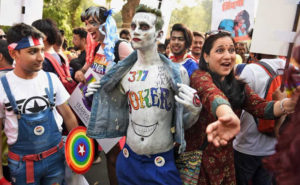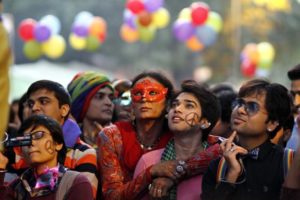Love in the Time of Section 377
Are court room victories reflective of India’s preparedness for LGBTQ communities?

C
elebrated American writer James Baldwin said that “Everybody’s journey is individual. You fall in love with a boy, you fall in love with a boy. The fact that many consider it a disease says more about them than it does about homosexuality.”
This holds true for the traditional Indian society which often steers clear of anything that betrays the majoritarian discourse. Notwithstanding the plethora of classic literature or art and sculptures adorning the walls of historical temples, monuments which indicate that homosexuality was a part of Indian culture, it is still painted as ‘unnatural’.
Giving this view a legal foothold is the 1861 Post Victorian-era law, Section 377 IPC which criminalises ‘voluntary carnal intercourse against the order of nature’, thus effectively criminalizing homosexuality. The draconian law is modelled on the U.K’s Buggery Act, 1553, an anti-sodomy law which criminalized sexual acts not meant for procreation. While under the garb of Indian culture we still continue to be dictated by the Victorian era morality imposed upon us by Thomas Macaulay, homosexuality was decriminalized in U.K in 1967.
“So why is homosexuality still illegal in India? Other than it being ‘unnatural’ and causing the apparent destruction of the Indian culture, the proponents of this law cite lack of laws to cover cases not falling under the rape laws of the country.”

However, laws like the Criminal Law Amendment Act, 2016 passed after the Nirbhaya case, POCSO Act and the recent amendments made in it after the Kathua-rape incident make the impugned section redundant. Although the section criminalises any penile-non-vaginal penetration, it has been particularly used to victimize people in same-sex relationships.
The long-drawn battle against this law seemed to find a victorious end in the 2009 judgment of Naz Foundation Vs NCR Delhi, which decriminalized consensual sexual relations between adults and deemed Section 377 unconstitutional to the extent that it affected the fundamental rights of the LGBT community. This victory was shortlived and was soon eclipsed by the Suresh Koushal judgment (2013) which held that the impugned section was free from any constitutional infirmity, thus recriminalising homosexuality.
The onus was placed on the legislature to amend or repeal the section. After the 2013 judgment, the then-ruling government, led by INC and many other parties openly came out in support of LGBT rights. The present government has chosen silence over the issue for the most part or openly opposed homosexuality, with its prominent ministers calling it unnatural or a genetic flaw. On 29 September 2017, the UN passed a resolution denouncing death penalty for consensual homosexual relationships. India was one of the 13 countries to oppose the resolution. This sends out a loud and clear message not only to the international community, but also to the native LGBTQ community that legal recognition to their rights is still a distant dream. The lack of political will is not so shocking, given the present government’s trend of turning a blind eye to everything that could make them lose favour of the religious fundamentalists and conservative voters.
“The lack of political action can be attributed to a lot of factors, the upcoming elections being one of them. However, despite their public stand on the issue, most of the ministers have personally told us that they have no problems with homosexuality.” Anjali Gopalan, Naz Foundation
The Right to Privacy Judgment delivered by the Apex court on August 24, which held sexual orientation an irrefutable part of privacy, shines as a beacon of hope as it practically set the stage to read down 377 and decriminalise homosexuality for good.
Justice D.Y Chandrachud wrote – “Right to Privacy and the protection of sexual orientation lie at the core of the fundamental rights guaranteed under Articles 14, 15 and 21 of the Constitution.”
The judges further held that the decision in Suresh Koushal judgment (2013) was erroneous and the fact that only “a miniscule fraction of the country’s population constitutes lesbians, gays, bisexuals or transgender and in last more than 150 years less than 200 persons have been prosecuted (as per the reported orders) for committing offence under Section 377 IPC..” cannot be used as a sound basis for denying basic rights of privacy. It was further iterated that majoritarian views cannot be the benchmark to dictate constitutional rights.
Owing to the curative petitions filed, the apex court in January 2018 agreed to review its 2013 judgment which upheld section 377. As the highest court of the country gears to either repeal or read down the impugned law, it is high time that the government breaks its silence, gets over its homophobia and transphobia and takes steps towards the same. Changing the law won’t immediately extinguish the stigma and discrimination that the LGBTQ community faces as courtroom victories don’t completely dictate the communities we live in. However, this surely will be a stepping stone in creating a safe space where people no longer feel the need to live in obscurity.
The need of the hour is to create inclusive policies to ensure equal opportunities in educational institutions, workspaces and to prevent discrimination against people not conforming to heteronormative notions of sexual orientation or gender. More initiatives like the health ministry’s ‘Saathiya Resource Kit’ created for adolescent educators should be encouraged. It, among other things, normalizes non heteronormative sexual attraction or gender identities among adolescents, which can go a long way in curbing the stigma associated with it.
In a modern democracy like India which upholds principles of Equality, Liberty and Fraternity, the State should not dictate whom to fall in love with or penalize people for their sexual identity. The government needs to understand that the much awaited ‘Acchey Din’ can’t be harboured in by ignoring the rights of the LGBTQ community. As the world celebrates LGBT-pride month, let’s hope for a society free from discrimination based on one’s sexual orientation.
